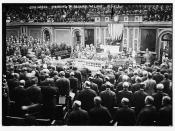The Great Depression Irving Fisher, an economist at Yale University in 1929, confidently stated, "The nation is marching along a permanently high plateau of prosperity."ÃÂ Less than a week later, the bottom dropped out of the stock market sending the American economy toward its worst downfall in history. The Great Depression was not only responsible for a dramatic change in the structure of American politics, but also for a change in Americans' expectations about government. The Depression affected all Americans, rich or poor, and was responsible for ushering numerous social problems into the lives of citizens.
Herbert Hoover was elected president in 1928. Prior to his election, during his acceptance speech for the Republican nomination, he stated, "We in America today are nearer to the final triumph over poverty than ever before in the history of any land. The poorhouse is vanishing from among us."ÃÂ Many Americans shared Hoover's optimism in the beginning of 1929.
On January 1, 1929, The New York Times printed an editorial reading, "It has been twelve months of unprecedented advance, of wonderful prosperity. If there is any way of judging the future by the past, this new year will be one of felicitation and hopefulness."ÃÂ Later that year, on Tuesday, October 29, the market crashed. This day is known as "Black Tuesday"ÃÂ and is considered the single most devastating financial day in the history of the New York Stock Exchange (NYSE). Prices fell so far in the first few hours that day, profits from the year before were completely wiped out. America spent nearly thirty million dollars on WWI. A comparable amount was lost from the American economy in the two weeks between October 29, and November 13, 1929.
High school dropout rates soared to nearly three million following The Crash. Unemployment and homelessness...


